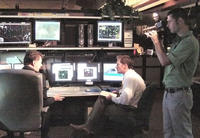-
Inquiring minds want to know
“It is not surprising to see more FOIA [Freedom of Information Act] requests sent in to an administration that has emphasized transparency… We’re making a strong effort to keep up with that demand by devoting more resources to it.”
White House spokesman Eric Schultz on why the Obama administration could not keep pace with the increasing number of people asking for documents, e-mails, photographs, and more under FOIA -
-
NYC cyberattack simulation to spur Senate cybersecurity legislation

Last Wednesday, in an attempt to bolster support for cybersecurity legislation, the White House staged a mock cyberattack on New York City’s power supply for the Senate
-
-
Missouri first responders learn from last year’s tornado season
Drawing on the valuable lessons learned from last year’s record tornado season, emergency officials in the St. Louis area were ready to spring into action immediately after tornadoes swept through the state once again last week
-
-
U.K. worried about dirty bombs

U.K. deputy prime minister Nick Clegg warned that materials to make a dirty bomb are readily available – so much so, that police forces cannot hope to contain such a threat; “That is a stateless threat, impossible for any national police force, no matter how advanced, to contain,” he said
-
-
No racial profiling, abuse by Secure Communities
The Earl Warren Institute at the University of California, Berkeley Law School claimed that DHS Secure Communities program suffers from a disturbing pattern of abuse of authority by ICE, including wrongful arrests of thousands of U.S. citizens, a pattern of racial profiling against Latinos, and denial of due process for aliens in removal proceedings; a new study by the Center for Immigration Studies says this is not the case
-
-
Public health expert: budget cuts will erode response capabilities
Homeland Security NewsWire’s executive editor Eugene K. Chow recently got the opportunity to speak with Dr. John R. Finnegan, the dean of the University of Minnesota School of Public Health; in their interview, Dr. Finnegan discusses the devastating effects of proposed budget cuts on the U.S. public health system, why it was a wise decision to censor the release of H5N1 flu research; and the creation of a medical reserve corps at universities
-
-
National Weather Service budget cuts threaten poor IT infrastructure

The Obama administration has proposed cutting more than $39 million from the National Weather Service’s (NWS) budget, particularly from its IT department, and critics worry that the cuts could cause the agency’s already crippling infrastructure problems to grow worse
-
-
FCC explores grating local police authority to shut off mobile networks
The U.S. Federal Communications Commission (FCC) is currently seekingpublic comment on whether it is appropriate for law enforcement agencies to shut down cell phone networks
-
-
Armed pilot program budget to be slashed in half

The Obama administration’s budget proposes cutting more than half the funding for a program that trains airline pilots to wield guns in the event of a terrorist takeover; the program is voluntary and consists of an intensive eight-day training course and a recurring training every six months; thousands of U.S. airline pilots have been trained to carry weapons as a final line of defense against terrorism
-
-
Making bus transportation more secure: Learning from Israel’s experience
A new report on ground transportation security draws on the experience of Israel with Palestinian terrorists’ attacks on buses; the report helps increase understanding of what can happen and of what can deter, prevent, and mitigate terrorist attacks against bus transit
-
-
Google's new privacy policy
“On its best day, with every ounce of technology the U.S. government could muster, it could not know a fraction as much about any of us as Google does now.”
Shelly Palmer, technology analyst -
-
FBI increasingly concerned with “sovereign citizen” movement

Over the past decade, the FBI has grown increasingly concerned with the “sovereign citizen” movement; since 2000, sovereign citizens have killed six police officers and violent battles with law enforcement agents are on the rise; the U.S. National Counterterrorism Center classified the movement as a major threat alongside Islamic extremism
-
-
Experts: White House consumer privacy plan seriously flawed
Last week the White House announced its Consumer Privacy Bill of Rights, which would give consumers the right to exercise control over what personal data is collected and how it is used; an expert says more than thirty years of experience with control-based laws has demonstrated that they don’t work and they don’t protect consumer privacy
-
-
Nebraska debates disaster housing fund
Legislators in Nebraska are currently debating a law that would create a $2.5 million temporary housing fund for families who lose their homes in natural disasters
-
-
Virginia receives $40 million in federal disaster aid following quake
Following the rare east coast earthquake last year, Virginia has received nearly $40 million in federal disaster aid
-
More headlines
The long view
Kinetic Operations Bring Authoritarian Violence to Democratic Streets
Foreign interference in democracies has a multifaceted toolkit. In addition to information manipulation, the tactical tools authoritarian actors use to undermine democracy include cyber operations, economic coercion, malign finance, and civil society subversion.
Patriots’ Day: How Far-Right Groups Hijack History and Patriotic Symbols to Advance Their Cause, According to an Expert on Extremism
Extremist groups have attempted to change the meaning of freedom and liberty embedded in Patriots’ Day — a commemoration of the battles of Lexington and Concord – to serve their far-right rhetoric, recruitment, and radicalization. Understanding how patriotic symbols can be exploited offers important insights into how historical narratives may be manipulated, potentially leading to harmful consequences in American society.
Trump Aims to Shut Down State Climate Policies
President Donald Trump has launched an all-out legal attack on states’ authority to set climate change policy. Climate-focused state leaders say his administration has no legal basis to unravel their efforts.
Vaccine Integrity Project Says New FDA Rules on COVID-19 Vaccines Show Lack of Consensus, Clarity
Sidestepping both the FDA’s own Vaccines and Related Biological Products Advisory Committee and the CDC’s Advisory Committee on Immunization Practices (ACIP), two Trump-appointed FDA leaders penned an opinion piece in the New England Journal of Medicine to announce new, more restrictive, COVID-19 vaccine recommendations. Critics say that not seeking broad input into the new policy, which would help FDA to understand its implications, feasibility, and the potential for unintended consequences, amounts to policy by proclamation.
Twenty-One Things That Are True in Los Angeles
To understand the dangers inherent in deploying the California National Guard – over the strenuous objections of the California governor – and active-duty Marines to deal with anti-ICE protesters, we should remind ourselves of a few elementary truths, writes Benjamin Wittes. Among these truths: “Not all lawful exercises of authority are wise, prudent, or smart”; “Not all crimes require a federal response”; “Avoiding tragic and unnecessary confrontations is generally desirable”; and “It is thus unwise, imprudent, and stupid to take actions for performative reasons that one might reasonably anticipate would increase the risks of such confrontations.”
Luigi Mangione and the Making of a ‘Terrorist’
Discretion is crucial to the American tradition of criminal law, Jacob Ware and Ania Zolyniak write, noting that “lawmakers enact broader statutes to empower prosecutors to pursue justice while entrusting that they will stay within the confines of their authority and screen out the inevitable “absurd” cases that may arise.” Discretion is also vital to maintaining the legitimacy of the legal system. In the prosecution’s case against Luigi Mangione, they charge, “That discretion was abused.”
